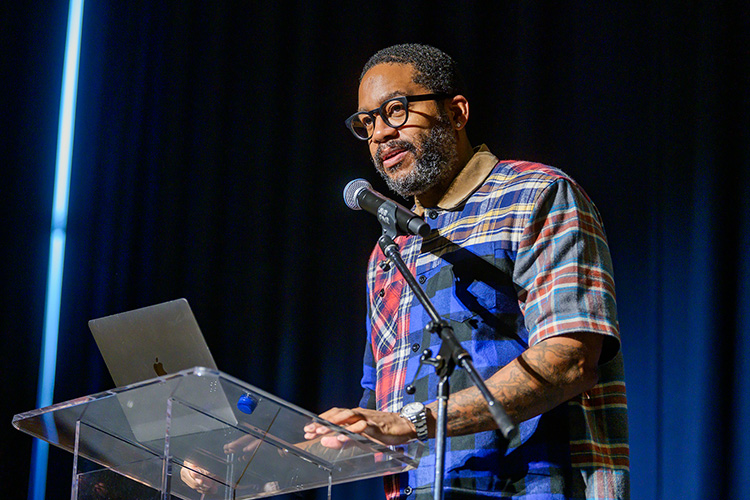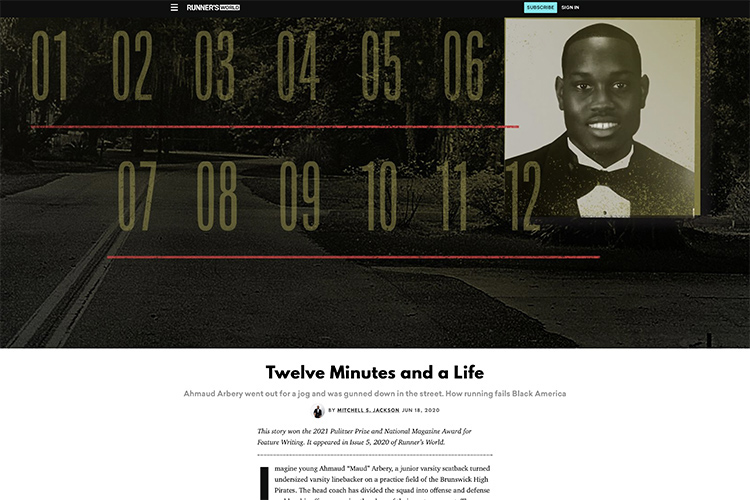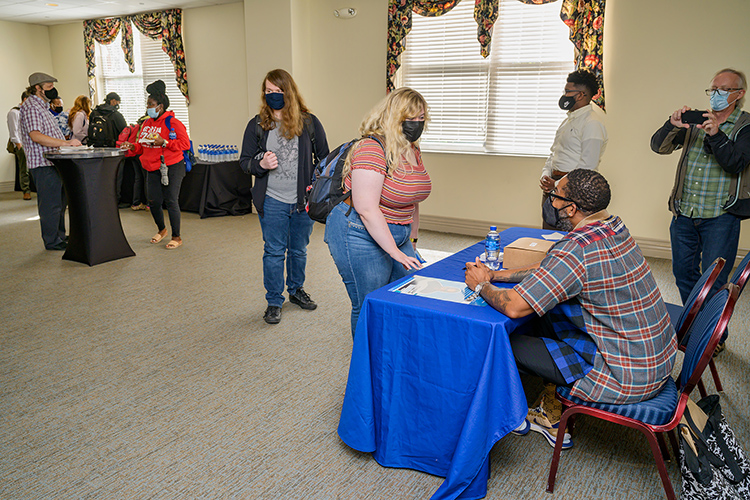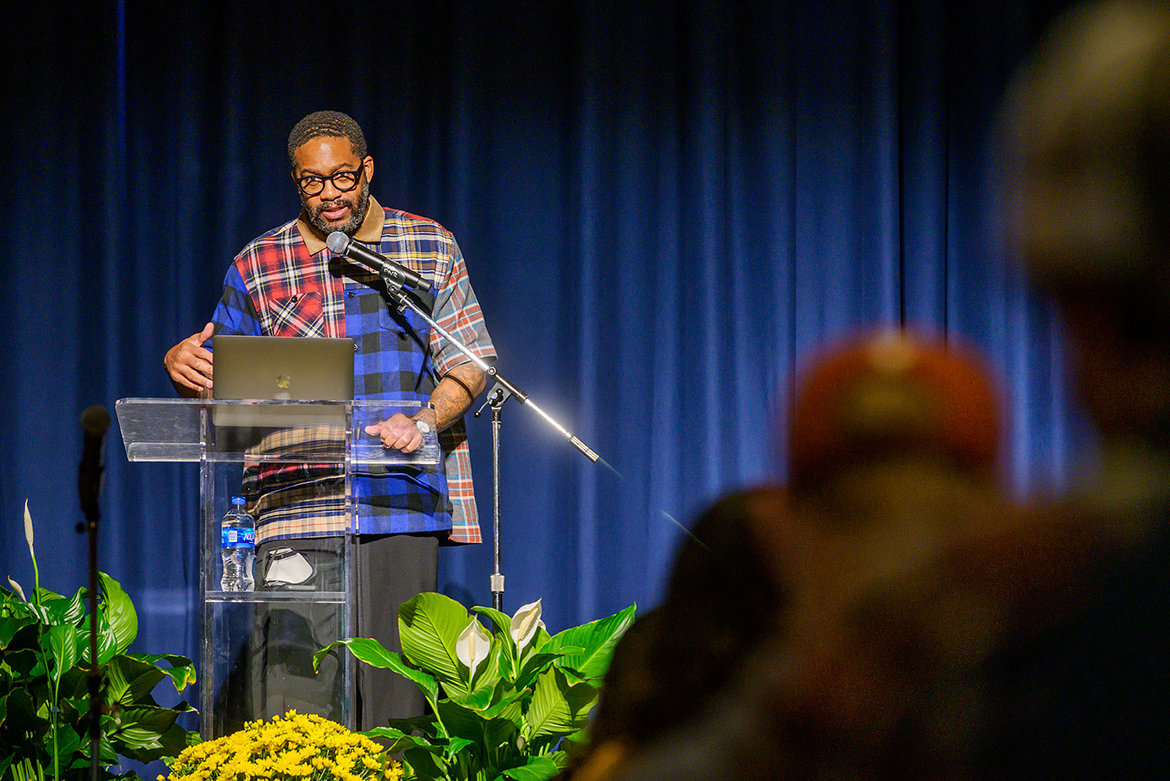As the murder trial begins this week for the three men accused in the 2020 slaying of Ahmaud Arbery, the Pulitzer-winning author who uniquely captured the journey to the young Georgia man’s last moments recently gave the MTSU community special insights into Arbery’s life and that of his own as a creative writer.
Author and novelist Mitchell Jackson presented “Revision: Finding Restoration and Empowerment with Creativity” in the Tennessee Room in MTSU’s James Union Building Oct. 6 as part of the university’s Pulitzer Prize Lecture Series. 
Jackson’s “Twelve Minutes and a Life” in Runner’s World magazine focuses on Arbery’s life and February 2020 death. It won the 2021 Pulitzer Prize in Feature Writing. The Pulitzer Series is sponsored by the John Seigenthaler Chair of Excellence in First Amendment Studies, the College of Media and Entertainment and the Free Speech Center at MTSU.
Arbery, an unarmed Black man, was out jogging when he was chased down and shot by three white men — Gregory McMichael, 65, a retired police officer, his son, Travis McMichael, 35, and their neighbor, William “Roddie” Bryan, 52 — who claimed he was breaking into homes under construction.

Pulitzer Prize-winning author Mitchell Jackson speaks Oct. 6, 2021, in the Tennessee Room of the James Union Building as part of the Pulitzer Prize Lecture Series sponsored by the John Seigenthaler Chair of Excellence in First Amendment Studies, the College of Media and Entertainment and the Free Speech Center at MTSU. (MTSU photo by Andy Heidt)
In a talk that shared frank personal reflections of his own journey through life, Jackson chronicled key markers in his own evolving destiny from a young boy whose natural father wasn’t around during his early years to the 20-something drug dealer who eventually got caught — but also caught a break from a judge who saw something more than a street criminal headed toward a life of crime.
 Rather than facing a decade of federal prison time, Jackson was instead sentenced to 16 months in state prison, and “that 16-month sentence was actually an opportunity for me to start to revise,” he told the audience. “Revision is at the heart of what I came to talk about.”
Rather than facing a decade of federal prison time, Jackson was instead sentenced to 16 months in state prison, and “that 16-month sentence was actually an opportunity for me to start to revise,” he told the audience. “Revision is at the heart of what I came to talk about.”
In writing, revision isn’t editing, Jackson continued, noting that editing “at its heart is a skill” — fixing comma splices, correcting a misspelling, etc. — while revision is “something else.”
“I think revision is seeing the work in context. I think it’s seeing the work in progress. I think revision is recognizing the parts of something and how they work to form a whole. Revision is seeing what could and should and shouldn’t be there, and then conceiving of ways to make it so.
“If editing is seeing what’s wrong and trying to fix it, revising — or re-visioning — is discovering what’s right and imagining how to make it more right.”

This screen capture shows the Runners World magazine webpage that features the Pultizer-winning “Twelve Minutes and a Life” story written by author Mitchell Jackson about the life and slaying of Ahmaud Arbery in February 2020 as he was jogging through a Georgia neighborhood. Click the image to read the story.
Jackson’s article about Arbery, which also won the 2021 National Magazine Award, incorporates his first-person narrative as another Black man who enjoys recreational running like Arbery did. The piece earned praise from the Pulitzer judges as a “deeply affecting account … that combined vivid writing, thorough reporting and personal experience to shed light on systemic racism in America.”
Jackson told the audience that he found parallels with his life and Arbery’s, with Jackson having early aspirations of becoming an NBA player while Arbery had dreams of making it to the NFL. Both would subsequently have run-ins with law after those dreams didn’t materialize, with Arbery sentenced to probation on a weapons and shoplifting charge.
But while Jackson — even after a prison stint — had the chance to “revise” his life into something more fulfilling and productive — earning master’s degrees in writing from Portland State University and New York University before becoming an award-winning author, writer, professor and now middle-aged father — the 25-year-old “Maud” got no such opportunity, he noted.
Jackson said in developing the article, he spoke to Arbery’s brother, sister, childhood friends, “the love of his life,” his football coach, and others. In doing so, he learned not only about Arbery’s triumphs, “but also some of his disappointments,” including not reaching that NFL goal or even getting a college football scholarship.
Making your wound your bow
In framing his approach to writing, Jackson also shared some of his writing philosophies and principles. They are gleaned from authors such as Ernest Hemingway and particularly Edmund Wilson, whose collection of essays “The Wound and the Bow” connects an author’s creativity to tapping into what has psychologically harmed them.
For Jackson, that meant honestly wrangling with the realities of a drug-addicted mom and other painful family issues that he initially was too embarrassed to write about, resulting in a “psychological distance in that (period of) work that disallows the reader to get close up. … I think one of the things that we should try to do as writers, and even as humans, is to compress the distance between ourselves, to get as close as we can to another human being.”
Jackson eventually overcame that fear of embarrassment thanks to his mentor Gordon Lish, an Esquire magazine editor in the 1970s who taught an immersive writing class that Jackson signed up following college after realizing that he simply wasn’t prepared to be a professional writer.
Jackson said Lish’s observation that Jackson “had a good ear” was revelatory for his growth as a writer, as well as Lish’s literary philosophy of “recursion,” which means “looking backwards to move forward … you find what’s valuable and you carry it forward.” But it also means leaving “the bad stuff behind. … This philosophy works on the page and in the world.”

Pulitzer Prize-winning author Mitchell Jackson, left, chats with Greg Pitts, director of the MTSU School of Journalism and Strategic Media, at the book signing and reception for Jackson following his talk Oct. 6, 2021, in the James Union Building as part of the Pulitzer Prize Lecture Series sponsored by the John Seigenthaler Chair of Excellence in First Amendment Studies, the College of Media and Entertainment and the Free Speech Center at MTSU. (MTSU photo by Andy Heidt)
Jackson’s autobiographic novel “The Residue Years” relates how a young man grew up in a neglected, crack-ravaged neighborhood in Portland in the 1990s. The book won a Whiting Award and the Ernest J. Gaines Prize for Literary Excellence. His “Survival Math: Notes on an All-American Family” chronicles his family life.
Jackson said embracing the wound-bow philosophy made such works possible.
“Ahmaud never got a chance to live that philosophy or recognize how his wound could become his bow,” Jackson said. “… In writing the story, understanding my own wound was crucial in connecting with him and his people.”
That connection, Jackson said, allowed him to develop an empathy for Arbery that kept his article from becoming “just another story. … What I did not want to do is write another story about the latest Black Lives Matter victim. I was not interested in that.”
“What I did want to do is write a story about a particular young man, with particular memories, with particular family members, with particular hopes, with particular dreams, and discover what his wounds were,” he said.
Using a quote from Indian philosopher and historian Ananda Coomaraswamy — “The artist isn’t a special kind of person, but every person is a special kind of artist.” — Jackson encouraged the audience to tap into that inner “artist” within all of us, regardless of our life pursuits.
“I do believe that we’re all special kinds of artists, that we should figure out how to make the decisions in our lives that provide fruitful results,” he said. “When I imagine the conversations I would have had with (Arbery), you can bet at some point I would have tried to convince him that he too was an artist. … I would have certainly tried to convince him that he was a special kind of young man … that he too at 25 had an opportunity to revise.”
Jackson took questions from the audience following his talk, and a reception and book signing were held afterward. MTSU faculty and staff welcoming Jackson to campus included Deborah Fisher, current Seigenthaler chair who introduced Jackson; College of Media and Entertainment Dean Beverly Keel; and Greg Pitts, director of the School of Journalism and Strategic Media.
— Jimmy Hart (Jimmy.Hart@mtsu.edu)

Pulitzer Prize-winning author Mitchell Jackson, seated right, chats with a student during the book signing and reception for Jackson following his talk Oct. 6, 2021, in the James Union Building as part of the Pulitzer Prize Lecture Series sponsored by the John Seigenthaler Chair of Excellence in First Amendment Studies, the College of Media and Entertainment and the Free Speech Center at MTSU. Also capturing the moment at right is journalism professor Leon Alligood. (MTSU photo by Andy Heidt)

Pulitzer Prize-winning author Mitchell Jackson shares his writing philosophies as part of Oct. 6, 2021, talk in the Tennessee Room of the James Union Building as part of the Pulitzer Prize Lecture Series sponsored by the John Seigenthaler Chair of Excellence in First Amendment Studies, the College of Media and Entertainment and the Free Speech Center at MTSU. (MTSU photo by Andy Heidt)


COMMENTS ARE OFF THIS POST